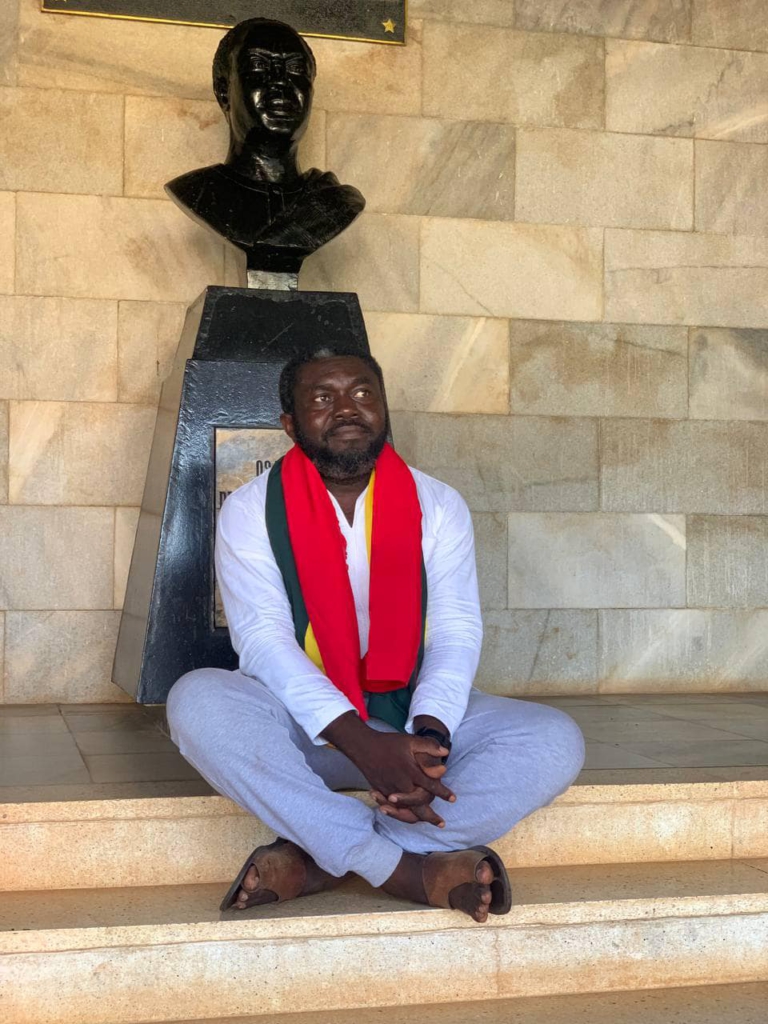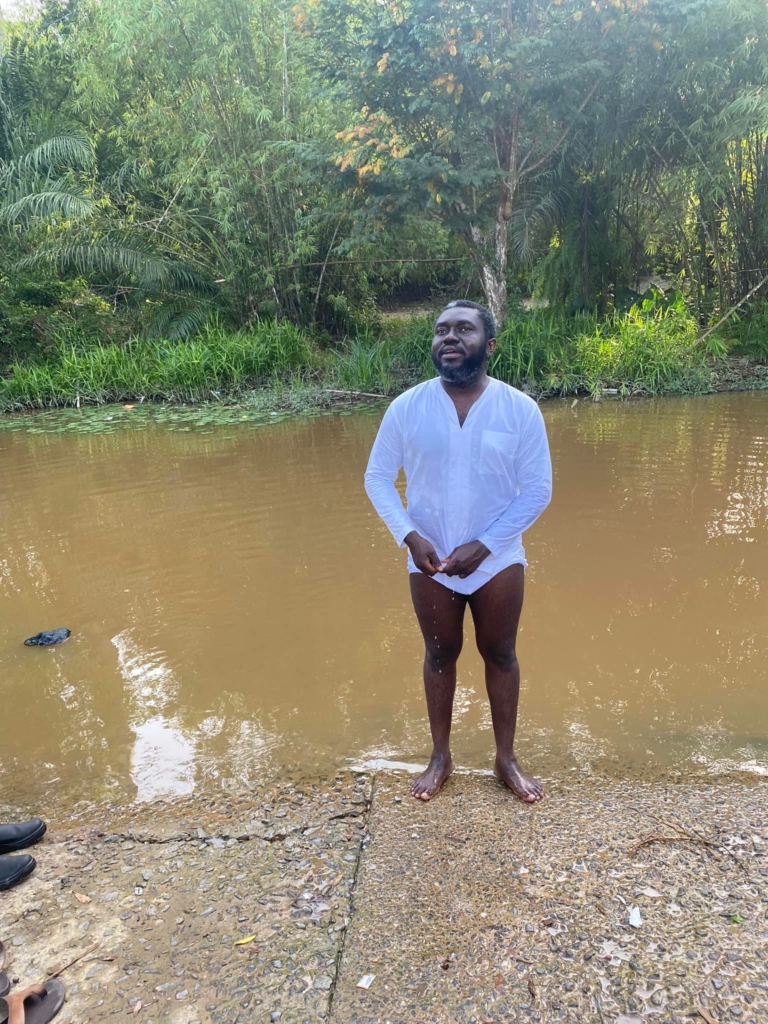Convener of the #FixTheCountry Movement, Oliver Barker-Vormawor has opened up about his trip to Nkroful, the hometown of Ghana’s first President, Dr Kwame Nkrumah.
In an extensive post on Facebook, the activist noted that he hoped to find “a renewed sense of purpose”.
After noting some detours he embarked on as part of the trip, Mr Barker-Vormawor noted that the tour proved to be enlightening as his tour guide told him stories that up until then had no idea about.
Through observation and some interaction, the activist was assured that the youth have not lost their faith that Change will happen.
Read his full post here:
Hey, how is your Sunday going? Are you Up for a little story? I say little but, we both know this is going to be one of my longer posts. So brace yourselves, if you haven’t given up yet.
So, a week ago, over the last long holiday weekend, I decided to take a trip to Kwame Nkrumah’s hometown, Nkroful.
Anyone who really knows me, will know I love road trips. Yet, for security reasons, I haven’t travelled alone since I was arrested.
But I wanted this journey to be a real spiritual one. I wanted to find a renewed sense of purpose for me; and I wanted to do so in a quiet moment. I wanted to be alone with myself.

This was truly a pilgrimage.
So I packed up bag and set off. First I stopped in Cape Coast to see my little brother at the University. We haven’t hanged out in a long time, and ever since I saw him and my father crying over my arrest, and when I was remanded by the District Court, my heart has stayed a little broken.

I used to say to my family that anyone who wants to be an activist must wait for his parents to die. My sister had told me that the last time they spoke recently, he had being stresssed about the possibility that I could face the death penalty. So I decided to make it up to the little man by just hanging out together.
When we did, I took him to visit my friends from the Ashaiman cells, who had been sentenced to Ankaful prison. I wanted him to see their humanity as much as I had done.
I wanted the hold that Prison had over his mind loosened,. And I thought the way to do this was if he saw them truly as humans still.
But when we got there, the prison officers said because he was wearing shorts, they won’t allow him to go in. So I ended up going to see them alone. It was the first time seeing them since I was released. We had a truly bonding moment. Tears were shed
Then I took him to the Elmina slave castle, to appreciate the true cost of our freedoms. How oppressed our people had been for nearly 600 years; and why the sacrifice of freedom is one we must jealously guard even at the cost of our lives. We sat in the horrible reminder that our fellow Africans were collaborators of the white man’s inhumanity. That oppression is not something only a stranger is capable of; but that our own kith and kin, those who share our skin colour and call us brothers, can be and have been partakers of our oppression.
We reflected on the fact that several of our fathers and mothers, threw themselves out to sea, and accepted the fate of death rather than be slaves in another man’s land. Yet today, when surveyed, Ghanaian youth say, if a slave ship was parked today, they will run to it themselves. What an inhumane society we have created. May the ancestors curse our greed and the society we have created?
We also did the Kakum Canopy walk way. Let me tell you a story about my first time doing that walkway. When I was in Junior high school, or Jss as we called it then I was 10 years old at the time. I saw an a poster advertising that workers of the VRA were planning an excursion to Aboadze Thermal Plant and Kakum National Park. It will cost 3,500 at the time. I went home, didn’t talk to anyone, broke my piggy bank (susu box) open and went to pay for myself.
Then as the day drew close my mum found out and she was livid. I have never been so insulted in life. But I was determined. I knew I would receive no help for my trip. I washed my clothes, and cleaned my sneakers. Then the night before, I went to buy a tin of rice, and eggs, and made myself rice and egg stew. In the morning, I woke up at 3am, got ready, packed the food into a blue-band margarine container and took my school bag and went to catch the bus whic was leaving Akuse at 4am.
I loved that trip because It was taken in defiance of parental authority. I felt free; and truly felt I did something for myself. I was scared shitless on that canopy walk that day. But I didn’t want any of the grown ups to see my fear. I didn’t want stories of my crying to flow back and take away from my endeavor. So I braved through out; with my legs shaking at every step.
I took my kid brother there because Kakum remains truly special for me. Someday, if I have a kid, I will let her do that trip, possibly alone.
Then I left my Kid brother for Nkroful. Nkrumah’s birth place and home. If you must know, it is closer to the Côte d’Ivoire border, than it is to Accra. I didn’t know what to expect.
When I got to Nkroful, I knew no one there, so I drove around the town till I saw a signboard that directed to Nkrumah Mausoleum.
When I got there was no one there. And the short metal gates that prevented access to the grounds was held together by a padlock that was not locked the whole way through. You could see through the compound because the gate only stood at my waist. I hadn’t seen that the padlock wasn’t in fact locked yet, so I wondered if I should jump the wall.
I stood for a while. My Ghana flag hanging around my neck. Then I saw a little boy walk past me. Probably 6 years old if not younger. He was wearing one of the Tshirts we made when we organized the Fix Nzema demonstration. It was bigger than him, so he looked even smaller for the age I assumed for him. He was joining his playmates playing football just beside the Mausoleum.
Then I heard the gate creek and I looked closer. I noticed the padlock wasn’t locked, so I went in.
I felt my legs shake as I went in. I sat by his statue and what used to be his grave for hours. I prayed there. I walked around what used to be his mothers kitchen; then where the family bedroom was.
Then as I prepared to leave a young man walked there. He said he was looking for some friends he had asked to wait there. So he had come to find them. I said there was no one here when I arrived. Then he told me that he used to be a guide there before he left for school and now was a national service person at a nearby mining company.
He told me of how Nkrumah’s body was moved from Nkroful to Accra by the Rawlings Government. That visiting dignitaries would want to see the body, except the road to Nkroful was Terrible; and the government was embarrassed by it. So they asked the family that they wanted to move the body to Accra. The family asked that their roads be fixed instead. So the Government stopped providing the chemicals that would preserve the body, so it started to decompose. So the family allowed the Government to take the body to Accra.
I felt such a sense of theft, on hearing that story. Our government refused to use Nkrumah’s body as a pillar to lift that community from underdevelopment. Hmmm
Then He told me that my journey would not be complete unless I went into a stream behind the mausoleum, where Nkrumah used to swim and bathe. It was also the same source of water for the community.
The mysterious river he called it. It was known as River Subile (meaning black river). He told me a local folklore of how Nkrumah’s fate as a great person had been predicted by a traditional (not fetish) priest, after he watched his mum step on a fish in that water.
Also how, Nkrumah when president had found out the water had dried up, and went there to pray with drinks to the ancestors. The heavens opened and it rained; the river filled up and since then it has never dried again.
When he took me to the river, I was hesitant to enter it because like all water bodies in the western region, mining has turned this river brown too. But I removed my trousers, got over it and went in.

Then he told me that every President in this country, with the exception of perhaps military leaders have come to bathe the water.
That when Mills lost twice, he came there and used the water to clean his hands. He won the next election. That Nana Akufo-Addo had done the same. I thought the story improbable but I laughed.
Then as I prepared to leave, he turns to me and said “Oliver, can I ask you a question?’.
I said, wait what, you knew who I was? I had so much been enjoying my anonymity till that moment. Something which has been lost. There was no town or village I went to that I wasn’t recognized in; sometimes despite my disguise. Even at Nzulezo, someone came up to me to confirm if I was “ the #FixTheCountry guy, mr Oliver”.
So I was very surprised because till then he gave me no sign of recognition. He asked me “Are you a politician”. I thought the question strange, so I asked back, what is a politician. He said “are you doing this for the NPP or the NDC ? I said neither.
Then he took out his phone, and he had screenshotted almost every news piece about me. He even had questions he had written down on his phone for me. I thought to myself, this guy had questions to ask me, on the off chance if he ever met me?
Then he told me why he asked that question. I understood that he believes a revolution was soon near. And that he was awake. That soon many other Ghanaians would too. He wanted reassurance that I was genuine; and that I wasn’t doing any of this just to leave them high and dry in their hope. He wanted my reassurance that Ghanaians were not just resigned to accept their oppression and that they had not lost their faith.
I told him I believed that freedom was destined; and that we will win. That I so much believed it. I told him my own story. Of how I grew up in a town just like his. How my ggrandparentslost everything to the construction of the Kpong Dam.
That those who have lived a life of privilege, and those who grew up poor like us, but I have lost their roots and sense of justice, do not sufficiently understand the underbelly of resentment that has built up in the plains and countryside of Ghana.
We said our goodbyes, in the knowledge that our story was not yet complete.

